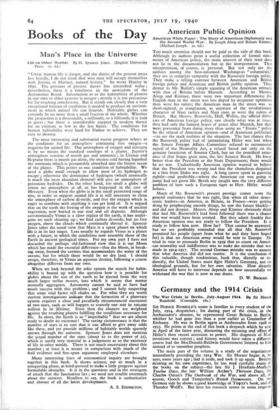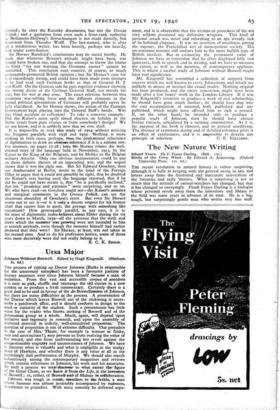Germany and the 1914 Crisis
The War Crisis in Berlin, July-August 1914. - By Sir Horace
Rumbold. (Constable. as.) '
SIR HORACE RUMBOLD'S name is familiar to every student of the July, 1914, despatches ; for during part of the crisis, in the Ambassador's absence, he represented. Great Britain in 'Berlin, whither he had gone less than a year earlier as Counsellor of Embassy. He was in Berlin again as Ambassador from 1928 to 1933. He prints at the end of this book a despatch which he sent in April of the latter year, discussing the meaning and effect of Hitler's then recent accession to power. His diagnosis of Nazi intentions was correct • and history would have taken a different course had the MacDonald-Baldwin Government listened to him instead of to smoother prophets.
The main part of the volume is a study of the negotiations immediately preceding the 1914 War. Sir Horace began it, he says, some years ago ; laid it aside, and took it up again. Besides drawing on his own experience,, he has read- carefully many of the books on the subject—the late Sir J. Headlam-Morley's Twelve Days, the late William Archer's Thirteen Days, Sir Charles Oman's The Outbreak of the War, and above all, of (aurae, Gooch and Temperley's British Documents. On the German side he shows a good knowledge of Tirpitz's book, and of Theodor Wolff's. But here his research seems in some respects limited ; he cites the Kautsky documents, but not the Grosse Politik ; and a quotation from even such a front-rank authority as Bethmann-Hollweg's Betrachtungen is not made directly, but borrowed from Theodor Wolff. The last-named, who is after all a tendentious writer, has been heavily, perhaps too heavily, laid under contribution.
Sir Horace Rumbold's conclusions may be stated briefly. He finds that whatever Britain's attitude might have been, war would have broken out, and that the attempt to throw the blame on Grey "for not warning the Germans sooner" cannot be sustained. This conclusion runs counter, of course, to much propaganda-prompted British opinion ; but Sir Horace's case for it is exceedingly strong, and could have been made even stronger if he had read such German books as that of General H. J. von KUM. On the German side he puts together evidence showing the strong desire of the German General Staff, not merely for war, but for war at that time. The exact relations between this dominant war-willing force and the different elements in the formal political government of Germany will probably never be fully elucidated. As Sir Horace shows, the action of the German Government kept playing into the General Staff's hands. Was this blind accident or collusion? To take a concrete example : Did the Kaiser's most aptly timed absence on holiday in the Baltic result from pure chance or from somebody's design? We do not know, and it is unlikely now that we ever shall.
It is impossible to read -this -study of- 1914,-without noticing the frequent parallels with 1938 and 1939. Nothing• is more striking in both cases, perhaps, ,than. the professional reluctance of diplomatists-to draw an obviasss4ufe.rence if it is.a sinister one. For instance, on pages 27-28 ; here -Sir Horace relates the well- attested story of the language held in November, 1913, by the Kaiser to the King of the Belgians, and by Moltke to the Belgian military Attaché. Only one obvious interpretation could be put on those definite threats of an impending war, and the sequel shows that it was the right one. But Sir Edward Goschen, then our Ambassador at Berlin, wrote to the head of the Foreign Office to argue that it could not possibly be right, that he doubted the Kaiser's ever having used the language reported, that if he did he could not hive meant it, that " he is pacifically inclined," that his " prudence and patience " were surprising, and so on. We who have read—as Goschen could not—the Kaiser's minutes and marginal comments in the Grosse Politik, can see the disastrous absurdity of Goschen's error. But even Sir Horace seems not to see it—or is it only a decent respect for his former chief that causes him to quote the passage with soinething like encomium? How grotesquely- parallel, in any case, it is to the mass of diplomatic make-believes-about Hitler dining the six years down to March, 1939—all the pretence that the teeth and claws which the monster was growing- were not intended to bite or scratch anybody, even though the monster himself had earlier declared that they were! Sir Horace, at least, was not taken in the second time. And to do his profession justice, some of those who most decisively were did not really belong to it. - R. C. K. ENSOR.



































 Previous page
Previous page